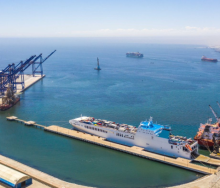The upward trajectory in air cargo demand evidenced during the Covid-19 pandemic has ended, with data for March released by the International Air Transport Association (Iata) showing a downward trend.
The effects of Omicron in Asia, the Russia-Ukraine war, and a challenging operating backdrop have been cited as contributing factors.
In its February report, which saw a demand increase of 2.9% year-on-year, Iata Director General Willie Walsh warned that the negative impacts of war and related sanctions (particularly higher energy costs and reduced trade) would become more visible from March. And that’s exactly what has happened.
Cargo demand was tracking below pre-Covid-19 levels, and capacity remained constrained, said Iata.
- Global demand, measured in cargo tonne-kilometres (CTKs), fell 5.2% compared to March 2021 (-5.4% for international operations).
- Capacity was 1.2% above March 2021 (+2.6% for international operations). While this is in positive territory, it is a significant decline from the 11.2% year-on-year increase in February. Asia and Europe experienced the largest falls in capacity.
Iata explained that the war in Ukraine had led to a fall in cargo capacity used to serve Europe as several airlines based in Russia and Ukraine were key cargo players. Sanctions against Russia led to disruptions in manufacturing. And rising oil prices are having a negative economic impact, including raising costs for shipping.
New export orders, a leading indicator of cargo demand, are now shrinking in all markets except the US. The Purchasing Managers’ Index (PMI) indicator tracking global new export orders fell to 48.2 in March. This was the lowest since July 2020.
“Air cargo markets mirror global economic developments,” said Walsh. “In March, the trading environment took a turn for the worse. The combination of war in Ukraine and the spread of the Omicron variant in Asia have led to rising energy costs, exacerbated supply chain disruptions, and fed inflationary pressure. As a result, compared to a year ago, there are fewer goods being shipped - including by air. Peace in Ukraine and a shift in China’s Covid-19 policy would do much to ease the industry’s headwinds. As neither appears likely in the short term, we can expect growing challenges for air cargo, just as passenger markets are accelerating their recovery,” he added.
In terms of regional performance, African airlines saw cargo volumes increase by 3.1% last month compared to March 2021. Capacity was 8.7% above March 2021 levels.













